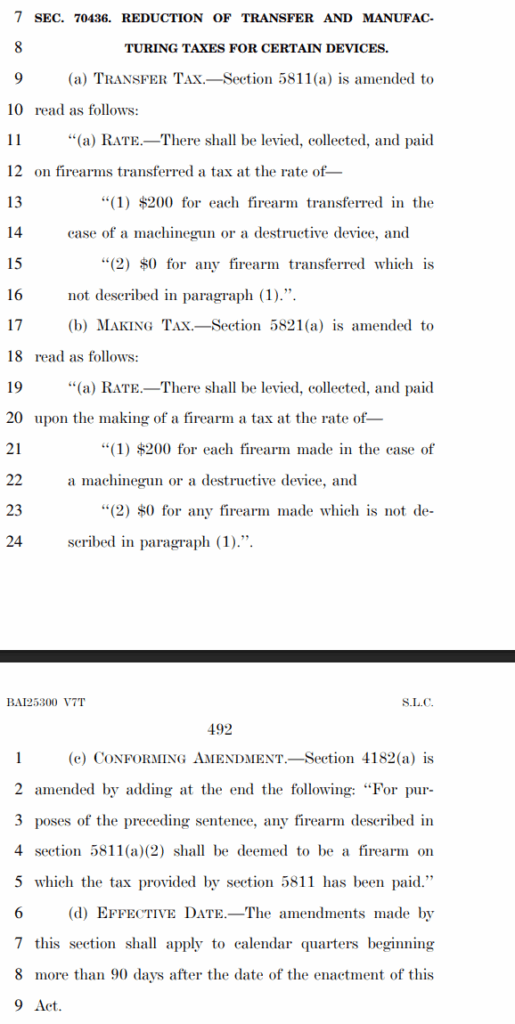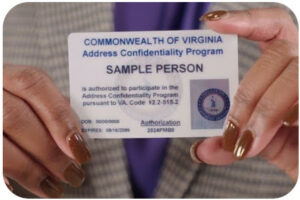 NOTE: I will keep this post updated as the bill moves throughout the legislative process.
NOTE: I will keep this post updated as the bill moves throughout the legislative process.
————————————————–
Update – July 2, 2025
With Vice President JD Vance casting the tie-breaking vote, the Senate passed the revised version of the bill that includes the revised Section 70436 described in my June 29 update below.
The bill now goes back to the House where they can either accept the changes as-is or modify the bill further and send it back to the Senate.
While Gun Owners of America and other gun-rights groups are encouraging the House to re-add the full NFA repeal for suppressors and short-barreled rifles and shotguns, this would almost certainly result in the bill not making it to the President’s desk by his self-imposed deadline of July 4th so the chances of that happening appear slim.
————————————————–
Update – June 29, 2025
After the Senate Parliamentarian removed the HPA and SHORT Act provisions of the ‘Big Beautiful Bill’ as violative of the “Byrd Rule”, the latest revised version of the bill has brought the issue back into the bill in a modified form.
Section 70436 leaves suppressors, short-barreled rifles, and short-barreled shotguns subject to all current NFA requirements, including registration and transfer limitations, but removes the $200 transfer tax for all NFA items except machineguns and destructive devices.

————————————————–
Update – June 28, 2025
The Senate Parliamentarian has removed the HPA and SHORT Act provisions of the ‘Big Beautiful Bill’ as violative of the “Byrd Rule”.
The “Byrd Rule” refers to the fact that budget reconciliation matters (such as this bill), when being considered by the Senate, may be approved by a simple majority instead of 60 votes to avoid a filibuster. However, only certain provisions may be included in a bill for it to take advantage of this process.
Despite the courts upholding the NFA multiple times over the years on the basis that it is not a gun control measure but rather a tax, the Parliamentarian ruled that the NFA related provisions (among many others) were not appropriate to be included in this bill under the Byrd Rule.
The Senate has 3 options at this point:
- Accept the recommendation of the Parliamentarian and pass the bill without the HPA and SHORT Act provisions;
- Add new provisions that keep the items on the NFA but reduce or eliminate the transfer tax; or
- Remove the Parliamentarian.
I do not believe that will choose option 3 for political reasons. Therefore, I suspect the best we can reasonably expect is option 2 … and the Republicans may choose to avoid the issue altogether in order to meet their self-imposed goal of passage by July 4th.
————————————————–
Update – June 17, 2025
The bill has been modified in the Senate to include the totality of the SHORT Act which removes SBRs, SBSs, and AOWs from the NFA and preempts state law regarding their ownership.
————————————————–
Update – June 17, 2025
The bill has been modified in the Senate to add Section 3 of the original Hearing Protection Act which reads as follows:
SEC. 3. Treatment of certain silencers.
Section 5841 of the Internal Revenue Code of 1986 is amended by adding at the end the following:
“(f) Firearm silencers.—A person acquiring or possessing a firearm silencer in accordance with chapter 44 of title 18, United States Code, shall be treated as meeting any registration and licensing requirements of the National Firearms Act with respect to such silencer.”.
This section is designed to mitigate the issue I described below in bullet point 4 and which is discussed in the video I embedded.
————————————————–
The original version of President Trump’s ‘One Big Beautiful Bill’ included a provision which eliminated the National Firearms Act (NFA) tax on suppressors but left them subject to the other provisions of the NFA.
In a subsequent amendment, which was approved by the House of Representatives, suppressors were removed from the NFA altogether.
But being approved by the House does not guarantee that version of the bill will become law. Now that it has passed the House, it must be voted on in the Senate. Often, the Senate will pass a different or modified version of a bill and then there has to be a conference committee convened to resolve the differences. So, the final version may be one of these two options or something else altogether.
Once both chambers have passed the bill, and any changes have been reconciled, the final version will be sent to the President to be signed or vetoed.
Some common questions I have been asked:
1) If passed, when will the bill become effective?
If signed by the President, the bill will become law and will be effective based upon the effective date laid out in the bill. The current version of the bill has this language regarding the effective date of the suppressor changes:
“(d) Effective Date.–The amendments made by this section
shall apply to calendar quarters beginning more than 90 days
after the date of the enactment of this Act.”
So … for example … if the bill was signed into law on July 4, then 90 days would take us to October 2. The quarter that starts after that date is the 1st quarter of 2026 which starts January 1. Therefore, if the current language survives the Senate, the bill would become effective January 1, 2026.
2) What will happen to those suppressors already registered under the NFA?
That is a good question that will probably not be answered until the ATF promulgates regulations following the enactment of the final bill.
3) Will there be refunds for those suppressors already registered under the NFA?
The bill does NOT provide for the refunding of previously paid excise taxes under the NFA.
4) If I currently live in a state that only allows suppressors if they are owned in compliance with the NFA, will I lose my suppressor?
That is a very interesting question. Attorney Tom Grieve has done a detailed breakdown of this issue on his YouTube channel.
Short answer … at least in the short term, there will almost certainly be collateral consequences in some states.

 I was recently contacted by an FFL I represent who had a post-sample machinegun being shipped to him that was lost in-transit.
I was recently contacted by an FFL I represent who had a post-sample machinegun being shipped to him that was lost in-transit.
 Recently, a dealer I represent contacted me with a question regarding an identification document that a customer was attempting to use to purchase a firearm.
Recently, a dealer I represent contacted me with a question regarding an identification document that a customer was attempting to use to purchase a firearm. I have written twice over the last several weeks about how the new ATF approval process is benefitting trust applicants as well as individuals, but I still have clients who want to see concrete examples.
I have written twice over the last several weeks about how the new ATF approval process is benefitting trust applicants as well as individuals, but I still have clients who want to see concrete examples.




